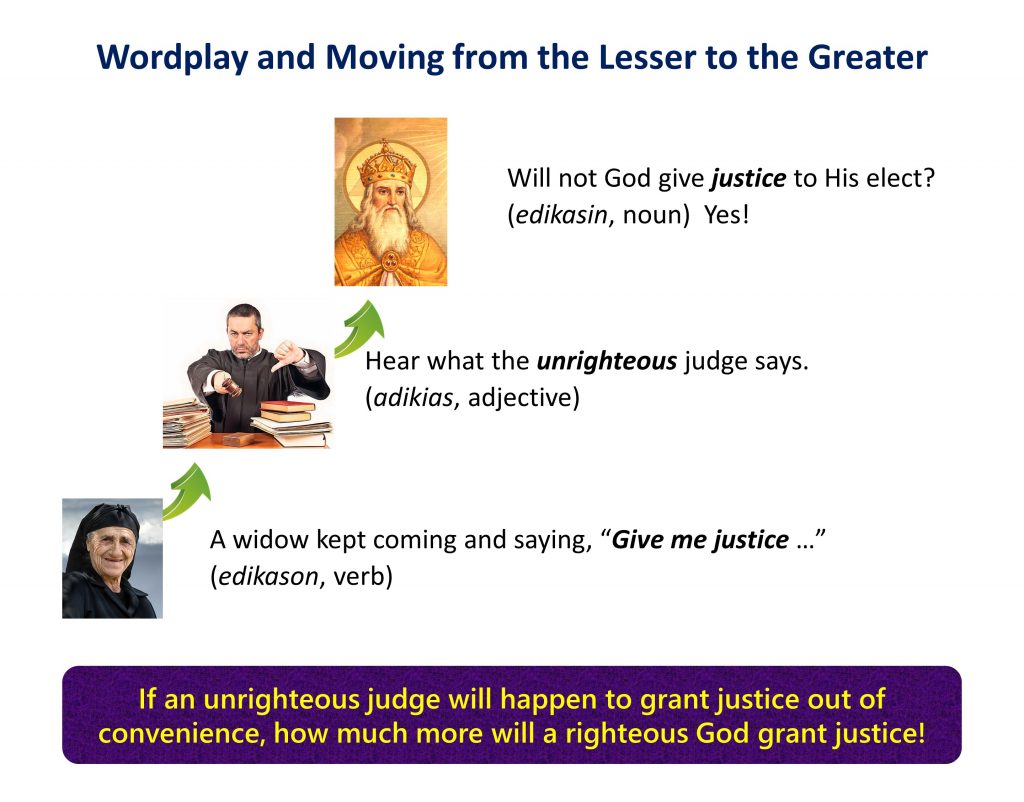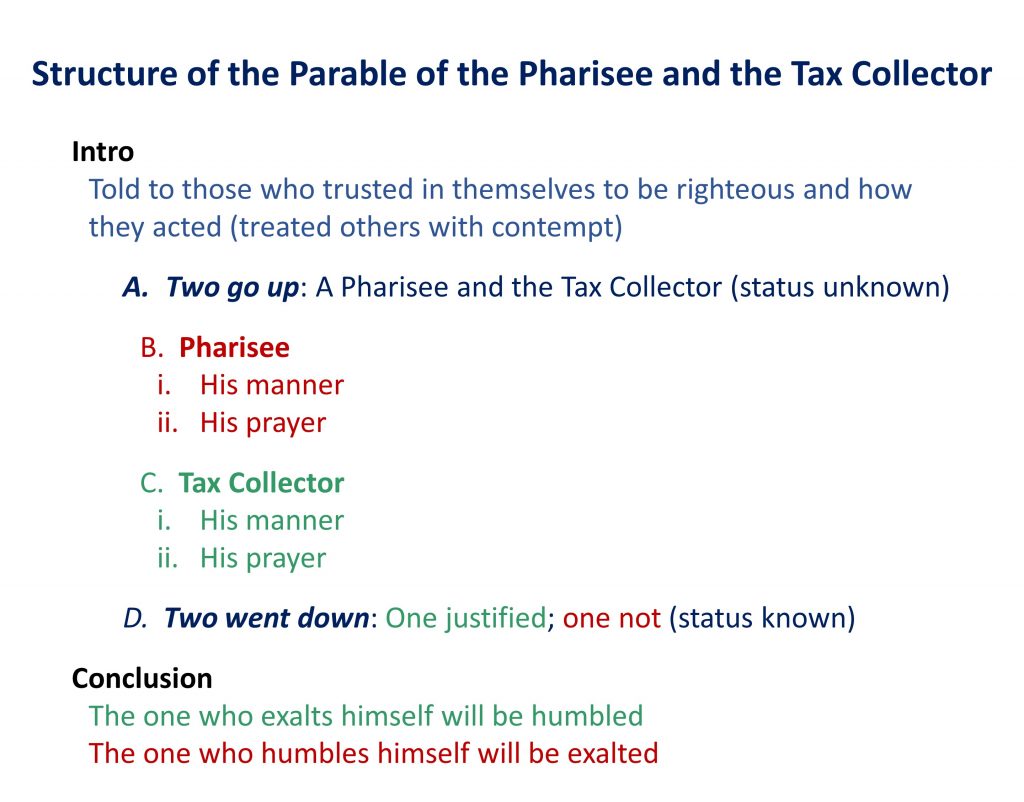 The Parable of the Unjust Judge: Luke 18:1-8
The Parable of the Unjust Judge: Luke 18:1-8
Background in Luke
Luke 17: 11-18: 8 is a significant unit focused on the “end times” with four major parts:
- Jesus heals the ten lepers: 17: 11-19,
- Jesus answers a question by some Pharisees about the coming of God’s Kingdom: 17:20-21,
- Jesus instructs His disciple on the end times: 17:22-37,
- Jesus encourages His disciple to pray and not become discouraged: 18:1-8.
Other than Jesus instructing His disciples about the end times, these accounts are unique to Luke (including the second parable we will study today).
So, why would Jesus tell His disciples a story about not becoming discouraged? What’s the context that makes the “why” of this parable meaningful? Let’s go back to Luke 17:22: “Then Jesus told the disciples: ‘The days are coming when you will long to see one of the days of the Son of Man, but you won’t see it.’” Jesus confronts the problem of doubt about whether He will ever return and the behavior such doubt produces (2 Peter 3:4-10).
We’ve been praying “Thy kingdom come” for years and He still hasn’t returned. So this doubt can also take root in us, and we can think, “Where is his ‘coming’ that he promised?” (2 Peter 3:4). The story Jesus tells encouragement for us also not to give up hope about Him returning and to keep on praying what He gives us to pray: “Thy kingdom come.”
The Parable
From the Old Testament, we learn the expectations about how judges are to dispense justice.
- You must not mistreat any widow or fatherless child. If you do harm them, they will no doubt cry to me, and I will certainly hear their cry. [Exodus 22:22-23]
- Do not deny justice to a resident alien or fatherless child, and do not take a widow’s garment as security. Remember that you were a slave in Egypt, and the Lord, your God, redeemed you from there. Therefore, I am commanding you to do this. [Deuteronomy 24:17-18]
When King Jehoshaphat appointed judges in Judah, he instructed them:
“Consider what you are doing, for you aren’t dispensing justice only by human standards but for the Lord, who is with you in the matter of judgment. Now let the fear of the Lord be on you. Judge with care, for with the Lord our God there is no injustice, partiality, or bribe-taking.” [2 Chronicles 19:6-7]
- God will not ignore the supplication of the orphan, or the widow when she pours out her complaint. Do not the tears of the widow run down her cheek as she cries out against the one who causes them to fall? [Sirach 35:17-19]
- Why should orphans and widows receive special mention in the applications of justice?
Because of their vulnerable position in society, widows were the focus of specific mandates for compassionate justice (Deuteronomy 24:17, Isaiah 1:17).
Jesus now uses the courtroom as a backdrop to instruct on how we are to pray.
Read Luke 18:1-2
- At the start, why is the judge unfit to dispense justice?
Read Luke 18:3
- Though not to us, what would seem unusual to a first-century listener of this parable?
- What did the woman keep doing? Why?
“Give me justice”: Since she asks for nothing but justice implies the law is on her side (See Sirach 35:17-21, Wisdom 2:1, 10, 21).
“my adversary”: Though not stated, the most common understanding of “adversary” in this setting would be someone who stood in the way of receiving what her husband has left for her. Often as not, such adversaries were members of the husband’s family! The “adversary” may imply those responsible for taking care of the widow, which may include marrying her and providing for all her needs. (See Deuteronomy 25:2-10)
Read Luke 18:4-5
- What didn’t cause the judge to render justice for the widow?
- What did?
“beat me down”: Greek, hupopiazo, literally to “strike under [the eye].”
“so that [ ] she will not”: Greek, eis telos, “in the end.” The ESV leaves this out. Jesus is pulling a double entendre. The judge doesn’t want the widow to keep pestering him—but Jesus is pointing His disciples toward His return, “in the end.” So, we could easily translate this “So, in the end, she will not keep giving me a black eye.” This end-times focus segues way well with what Jesus says next.
Read Luke 18:6-8
- What comparison (by contrast!) does Jesus make between God and the corrupt judge?
Read Luke 18:8
“speedily”: Greek, en tachei, “in speed.” Grammatically, this can mean either Jesus will return soon, or when He returns, it will be sudden and unexpected. The second meaning makes more sense since Jesus is teaching us to pray with persistence.
- Discuss: “When the Son of Man comes, will he find faith on earth?”
- What does the loss of faith cause someone to stop doing?
- Does prayer make someone faithful or do the faithful pray?
Now finished speaking about faith, where Jesus showed the faithful pray to a righteous God, Jesus now tells a parable about the source of one’s righteousness.
The Parable of the Pharisee and Tax Collector: Luke 18:9-14
The Setting
Read Luke 18:9
- To whom does Jesus tell this parable?
- Since the hearers trusted in themselves to be righteous, what do you think the point of the parable may be?
Excursus: The Character
The Pharisees: This group originated from the time of the Maccabees when Greek rulers wanted to rid the Jews of their religion and culture. A group formed within Israel, who wanted to remain Jewish. They called themselves the Chasidim (or Hasidim), based on the Hebrew word Chesed, which means “loyal, faithful, and enduring love.” For this group wanted to be loyal and faithful to God.
Later, these Chasidim withdrew their support for the Maccabees, when descendants of the Maccabees started serving as high priests. So, they separated and became known as the Perushim or “separated ones,” from where get the word “Pharisee.” The historian, Josephus, wrote of the Pharisees existing by about 150 BC.
For us, the Pharisees are the “bad guys.” In Jesus’ day, they were considered the “good guys.” For they did all the right things: praying, fasting, and giving to the poor. The problem with the Pharisees was not that they did good deeds (Jesus assumes we will fast, pray, and help the poor in Matthew 6) but that this became their source of righteousness.
Tax Collectors: These were among the most despised members of Jewish society because of their reputation for embezzling money and being complicit with the Roman oppressors. The Mishnah, the Jewish oral tradition later written down, prohibited receiving alms from a tax collector at his office, since the money is presumed to have been gained illegally. If a tax collector entered a house, all that was in it became unclean. The presence of a tax collector in the Temple was considered something that defiled the Temple.
————-
The Parable
Read Luke 18:10
- At this point, what would be the typical reactions of the hearers about the two who went into the Temple to pray?
Read Luke 18:11-12
- Whom does the Pharisee use as his standard for being righteous?
- Is it wrong for the Pharisee to fast and tithe?
- Why is the Pharisee “standing by himself”? What might this reveal about him?
The Jewish custom of the day organized prayer into three main categories:
- Confession of sin
- Thanks for what one has received
- Petitions for oneself and others
The Pharisee’s prayer doesn’t fall into any of these categories. So, he even fails by Jewish standards, leaving the hearer aghast. For the Pharisee doesn’t confess his sin, thank God for His gifts, or ask Him for help. The thought will now be: Since the Pharisee is so bad, will the tax collector be worse?
Read Luke 18:13
- Why didn’t the Tax Collector consider himself worthy to lift his eyes toward heaven?
“beat his breast”: This is a sign of a sign of mourning and/or repentance (See Isaiah 32:12, Jeremiah 1:19, Ezekiel 21:12, and Nahum 2:7).
- Based on his prayer, if the tax collector has a source of righteousness, from whom will he receive it? (Hint: count the number of time he uses “I” in his prayer.)
Excursus: Mercy
The tax collector cries out: “God be merciful …” He doesn’t use the normal word for “merciful,” eleeo but hilaskomai. This comes from the word for the cover, the “mercy seat,” over the Ark of the Covenant, hiliasterion, in the Greek-language Old Testament, the Septuagint. The 4th-century Armenian translation reads, “O God, make an atonement for me.”
In Leviticus 16, Aaron, the High Priest, sprinkled the blood of bulls and goats on the mercy seat. Underneath, inside the Ark of the Covenant, were:
- God’s Ten Words, or the Ten Commandments (Exodus 25:16),
- a jar of manna (Exodus 16:33-34),
- and Aaron’s walking stick, which had earlier budded with leaves (Numbers 17:10).
 Manna was the bread-like food God used to feed the Israelites during their 40 years in the wilderness. Manna was also the food the Israelites complained about, showing their sin and lack of gratitude toward God. The budded rod of Aaron was in the Ark because the Israelites rebelled and tried to set up their own priesthood, contrary to God’s command (Numbers 16-17). Of course, the Ten Commandments–who can follow those without flaw?
Manna was the bread-like food God used to feed the Israelites during their 40 years in the wilderness. Manna was also the food the Israelites complained about, showing their sin and lack of gratitude toward God. The budded rod of Aaron was in the Ark because the Israelites rebelled and tried to set up their own priesthood, contrary to God’s command (Numbers 16-17). Of course, the Ten Commandments–who can follow those without flaw?
Those three items in the Ark represented Israel’s sins. And how does someone become righteous before God? To forgive in the Old Covenant, God had the High Priest pour blood on the mercy seat, covering the sins of the people by the blood of a sacrifice. That was the whole point of the mercy seat: it was the place where God brought His forgiveness to His Old-Covenant people—pointing forward to Jesus’ sacrifice for sin.
———–
“God, be merciful to me, a sinner”: The Greek is not “a sinner” but “the sinner.” The tax collector understands, before God, his sins make him as if he is the only sinner. So, he is not comparing his sins to anyone else’s sins. So, he simply calls himself, “the sinner.”
Read Luke 18:14
- Why did the tax collector leave justified (righteous and acquitted of his sins)? (Hint: What is the difference between the Pharisees “I” and the tax collector’s “to me”?)
- How did the Pharisee exalt himself, which left him unjustified?
- What then is Jesus’ point?
Luke 5:32: [Jesus speaking,] “I have not come to call the righteous, but sinners to repentance.”



